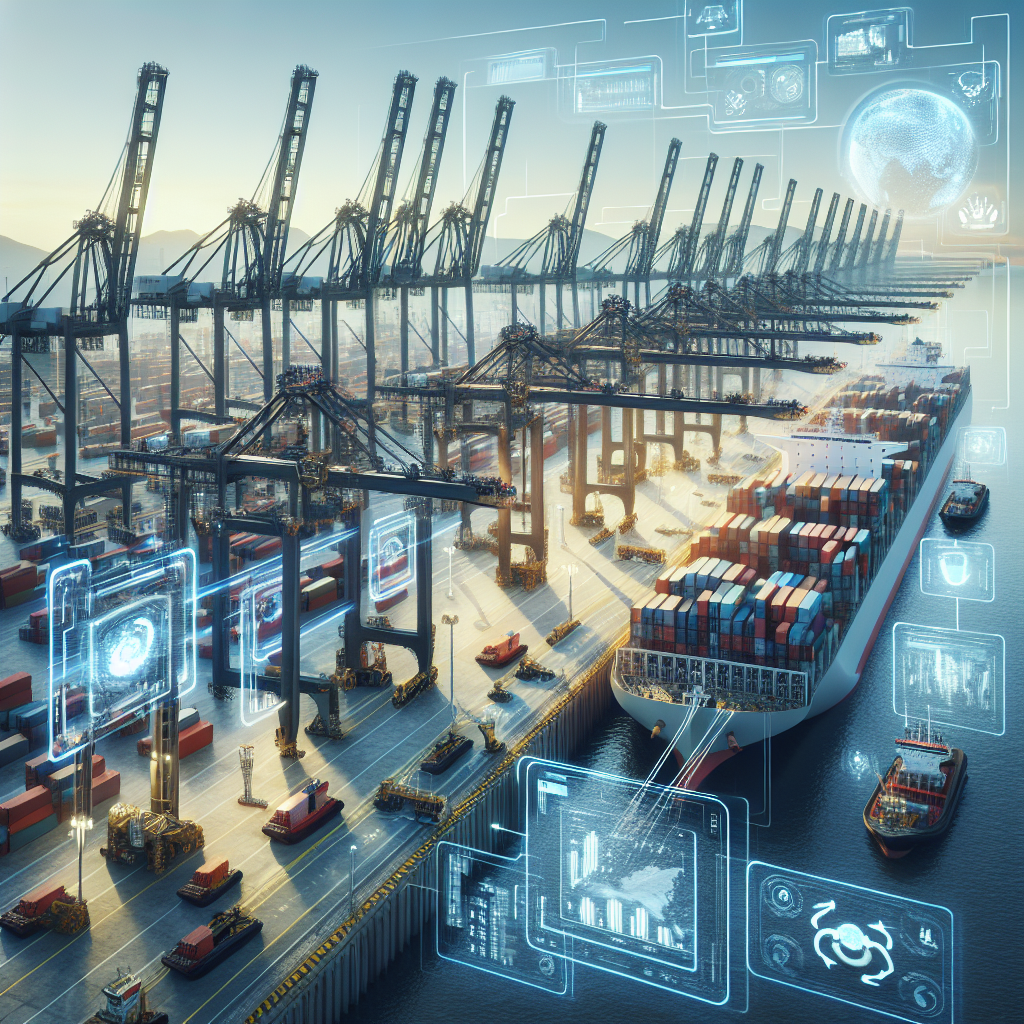AI-Powered Smart Ports: Improving Efficiency and Security in Transportation
In today’s rapidly evolving world, the transportation industry is facing increasing demands for efficiency and security. Ports play a crucial role in facilitating global trade and commerce, serving as the primary gateway for goods entering and leaving a country. With the rise of artificial intelligence (AI) technology, smart ports are emerging as a solution to enhance efficiency and security in the transportation sector.
What Are AI-Powered Smart Ports?
AI-Powered Smart Ports are ports that leverage artificial intelligence technology to optimize operations, improve efficiency, and enhance security. By integrating AI-powered systems and sensors, smart ports can automate processes, analyze data in real-time, and make predictive decisions to streamline operations and ensure the smooth flow of goods.
The key components of AI-Powered Smart Ports include:
1. Automated Systems: AI-powered systems can automate various processes in ports, such as container handling, cargo tracking, and inventory management. By using machine learning algorithms, these systems can learn from past data and make autonomous decisions to optimize operations and reduce human error.
2. Real-Time Data Analysis: Smart ports use sensors and IoT devices to collect real-time data on port activities, such as vessel arrivals, cargo movements, and weather conditions. AI algorithms can analyze this data to identify patterns, trends, and anomalies, enabling port operators to make informed decisions and respond to changes quickly.
3. Predictive Analytics: AI-Powered Smart Ports can use predictive analytics to forecast future scenarios and optimize operations accordingly. By analyzing historical data and external factors, such as market trends and weather forecasts, AI algorithms can predict potential disruptions and help port operators plan ahead to minimize impact.
4. Security Systems: AI-Powered Smart Ports implement advanced security systems, such as facial recognition, biometric authentication, and video surveillance, to enhance security measures and prevent unauthorized access. By using AI algorithms to analyze security data, ports can detect potential threats and respond proactively to ensure the safety of personnel and cargo.
How AI-Powered Smart Ports Improve Efficiency and Security?
1. Streamlined Operations: AI-Powered Smart Ports can automate repetitive tasks, such as container handling and cargo tracking, to streamline operations and reduce processing times. By optimizing workflows and eliminating bottlenecks, smart ports can increase throughput and improve overall efficiency.
2. Enhanced Predictive Maintenance: AI algorithms can analyze equipment data to predict maintenance needs and schedule repairs proactively. By implementing predictive maintenance strategies, smart ports can prevent equipment failures, reduce downtime, and extend the lifespan of assets.
3. Improved Resource Allocation: AI-Powered Smart Ports can optimize resource allocation by analyzing data on vessel arrivals, cargo volumes, and workforce availability. By dynamically adjusting resources based on demand, ports can minimize idle time, reduce costs, and improve efficiency.
4. Enhanced Security Measures: AI-Powered Smart Ports use advanced security systems, such as facial recognition and biometric authentication, to enhance security measures and prevent unauthorized access. By leveraging AI algorithms to analyze security data and detect potential threats, ports can strengthen security measures and ensure the safety of personnel and cargo.
FAQs about AI-Powered Smart Ports:
Q: How do AI-Powered Smart Ports ensure data privacy and security?
A: AI-Powered Smart Ports implement robust security measures, such as encryption, access controls, and data anonymization, to protect sensitive data and ensure privacy. By complying with data protection regulations and industry standards, smart ports can safeguard information and prevent unauthorized access.
Q: What are the potential challenges of implementing AI-Powered Smart Ports?
A: Some potential challenges of implementing AI-Powered Smart Ports include high initial costs, integration complexity, and workforce reskilling requirements. However, by investing in AI technology, training employees, and collaborating with industry partners, ports can overcome these challenges and unlock the benefits of smart technology.
Q: How can AI-Powered Smart Ports adapt to changing market conditions and disruptions?
A: AI-Powered Smart Ports use predictive analytics to forecast future scenarios and optimize operations accordingly. By analyzing data on market trends, weather forecasts, and other external factors, smart ports can adapt to changing conditions, minimize disruptions, and maintain operational efficiency.
Q: What are the benefits of AI-Powered Smart Ports for the transportation industry?
A: AI-Powered Smart Ports offer numerous benefits for the transportation industry, including improved efficiency, enhanced security, reduced costs, and increased competitiveness. By leveraging AI technology to optimize operations and streamline processes, smart ports can drive innovation, boost productivity, and deliver value to stakeholders.
In conclusion, AI-Powered Smart Ports are revolutionizing the transportation industry by improving efficiency, enhancing security, and driving innovation. By leveraging AI technology to automate processes, analyze data in real-time, and make predictive decisions, smart ports can optimize operations, streamline workflows, and ensure the smooth flow of goods. With the adoption of AI-Powered Smart Ports, the transportation sector is poised to meet the challenges of the future and unlock new opportunities for growth and development.

